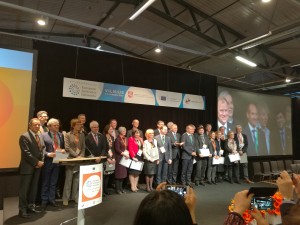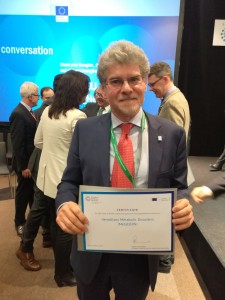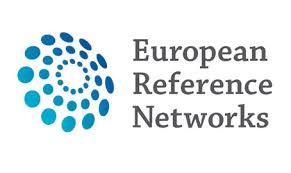
5 pm. 10 March 2017_Helios Dr. Horst Schmidt Kliniken (HSK)-Center for Rare Diseases, Department of Pediatric and Adolescent Medicine in Wiesbaden, Wiesbaden (Germany)
Following the first call for proposals in July 2016, the MetabERN was approved in December 2016 and launched today in Vilnius where the kick off meetings took place.
The Kick-off meeting aimed to give an overview presentation of the project’s objectives and to establish common ground of understanding, values and targets amongst partners, identifying potential problems which might arise during the project’s implementation and discussing the first year strategic plan in order to address them.
MetabERN represents the most comprehensive, inclusive and patient-orientated platform that will transform how care is provided to patients with metabolic diseases in Europe. 69 EU Hospitals from 18 countries joined synergies to set up MetabERN which will facilitate access to quality, affordable, cost-effective care across EU.
“We will change the way care is planned and provided to patients by bringing in the expertise of all relevant stakeholders, including Patient Associations and the Society for the Inborn Errors of Metabolism (SSIEM)” – said today Prof. Maurizio Scarpa, Director of the Rare Disease Center of the Helios Dr. Horst Schmidt Kliniken in Wiesbaden, Germany, coordinator of the MetabERN.
What is MetabERN?
The MetabERN is responding to the call for the establishment of European Reference Networks (ERNs) launched by the European Commission as laid down in the Directive on the patients’ rights in cross-border healthcare aiming to connect existing highly specialised healthcare providers across the European Union in the area of rare diseases. It represents 69 Founding Healthcare Providers from 18 European countries. MetabERN is committed to strengthen the cooperation among its members with the shared goal of improving the treatment and care for all patients affected by rare metabolic disorders in Europe and around the world.
What is the focus of MetabERN?
Inherited metabolic diseases (IMDs) are a group of more than 700 genetic and often lethal disorders affecting children and adults. Their diagnosis is often incorrect or delayed leading to wrong therapies that can harm the patients. Accurate and timely diagnosis demand highly specialised expertise, specific physical examinations, and appropriate multidisciplinary investigations.
What does MetabERN do?
MetabERN ensures a join-up approach to care by bringing together pediatric and adult metabolic physicians across the EU to deliver the best available care to patients affected by IMDs.
To this end, MetabERN has established a multi-disciplinary and multi-stakeholder platform to improve standards of clinical management and strengthen referral systems, seek consensus on EU guidelines and Standard Operating Procedures, share knowledge in a structured way, encourage virtual counselling and promote new clinical trials for the development of innovative therapies.
An informative synopsis about the European Reference Network for Hereditary Metabolic Diseases (MetabERN) has been developed with the aim to make different stakeholders aware about the project objectives and potentiality. It is being distributed to a large community of people interested in Inherited NeuroMetabolic Diseases including Healthcare Professionals, Patients and Families Associations and Health Authorities and EU Institutions, leading Universities and Research Institutions and Industry Players.
You can download the electronic version of the synopsys by clicking here.
For more information please contact
Prof. Maurizio Scarpa, MD, PhD
MetabERN Coordinator
maurizio.scarpa@metab.ern-net.eu
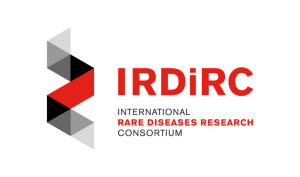



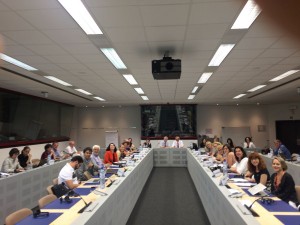
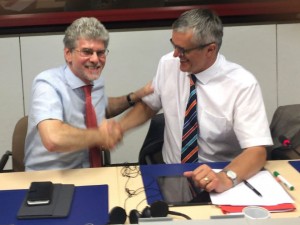 Prof Scarpa main key tasks are the following:
Prof Scarpa main key tasks are the following: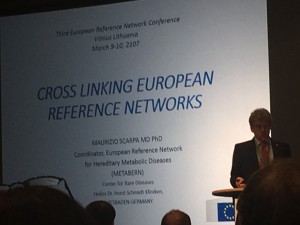 24 European Reference Networks (ERNs) were formally launched on 9 March 2017. Representatives from the networks and Member States, along with patients and policymakers, gathered in Vilnius, Lithuania, for the 3rd ERN Conference and kick-off meetings (9 & 10 March).
24 European Reference Networks (ERNs) were formally launched on 9 March 2017. Representatives from the networks and Member States, along with patients and policymakers, gathered in Vilnius, Lithuania, for the 3rd ERN Conference and kick-off meetings (9 & 10 March).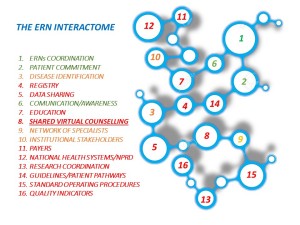 ERNs. “There is crosslinking in nature,” said Dr Scarpa. “Nothing is isolated.” He said ERNs should be at the frontier of ‘network medicine’ – a new way of thinking of health which breaks down silos between disciplines and disease taxonomies. Tools must be developed to link the ERNs, including a shared virtual counselling system that allowed members of different ERNs to discuss complex cases. “ERNs are not a project or a programme they are a concept – a revolution in the understanding of rare diseases,” he said. “Don’t think of ERNs as discrete networks but as a large task force for sharing expertise.”
ERNs. “There is crosslinking in nature,” said Dr Scarpa. “Nothing is isolated.” He said ERNs should be at the frontier of ‘network medicine’ – a new way of thinking of health which breaks down silos between disciplines and disease taxonomies. Tools must be developed to link the ERNs, including a shared virtual counselling system that allowed members of different ERNs to discuss complex cases. “ERNs are not a project or a programme they are a concept – a revolution in the understanding of rare diseases,” he said. “Don’t think of ERNs as discrete networks but as a large task force for sharing expertise.”
